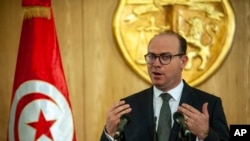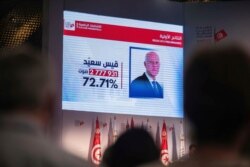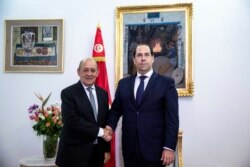For a country with a large share of unemployed workers, Tunisia has found it unusually difficult to fill a top post that of a prime minister capable of forming a government that can pass muster with its fractured parliament.
This past week, it may have found the man.
At 48, former finance minister and presidential candidate Elyes Fakhfakh is a youngish, if not a new face in Tunisian politics. While his own leftist party has little popular support, he may get the backing of key political forces. Tapped by President Kais Saied last Monday, he now has a month to form a Cabinet that meets legislative approval.
If he fails, the country risks new elections.
If he succeeds, Fakhfakh must grapple with multiple and sometimes conflicting challenges facing Tunisia, whose rocky political evolution remains closed watched as the only democracy to emerge from the Arab Spring. The North African country’s economy is struggling, joblessness is high and many Tunisians are soured on politics. There is also the risk of conflict spilling across the border from neighboring Libya.
“He has government experience, he is a credible figure, he is independent of the major political parties, but he’s positioned in a way that he’s able to draw political support from them,” said analyst Anthony Dworkin of the European Council on Foreign Relations, who has met Fakhfakh and considers him “credible.”
"He could be a sort of reforming prime minister and try to get to grips with the economy,” Dworkin added. “But at the same time, he will be politically weak.”
Others have already given Fakhfakh’s nomination a thumbs down.
"The public deficit exploded when he headed the country's finances,” said Tunisian columnist Nessim Ben Gharbia, in remarks published by Al Jazeera. “His party has no seat in parliament. It's no wonder his score at the last presidential election was only 0.34 percent."
Plan B
Fakhfakh’s nomination amounts to a Plan B for getting a functioning government off the ground following October’s presidential and parliamentary elections.
The inability of any establishment candidate or party to take the reins reflects voter anger over economic hardship and perceived corruption. The moderate Islamist Ennahdha party emerged considerably weakened in parliament, although it remains the biggest bloc.
Political newcomer Saied was voted in as president after a grassroots, door-to-door campaign. But finding a prime minister has been more difficult. Ennahdha’s choice, Habib Jemli, lost a confidence vote in parliament earlier this month.
Fakhfakh’s ability to reboot the economy will depend on his ability to negotiate with the country’s powerful trade unions, bring in foreign investment and overcome internal opposition to reforms, said Youssef Cherif, deputy director of Columbia Global Centers in Tunis.
"All these are uncertain points,” he wrote in an email.
Fakhfakh must also balance international lender demands for a viable strategy to move the country forward with those of Tunisians feeling the pain of currency devaluation and other austerity measures, said Michael Ayari, a Tunis-based senior analyst for the International Crisis Group.
"If the government doesn’t put in place a real strategy and can’t channel populist concerns about sovereignty, there risks to be a lot of instability and protests,” Ayari said.
Revolutionary ideals?
Fakhfakh has cast himself as responsive to the country’s disaffected electorate and fractious politics.
At a news conference Friday, he announced he would form a pared-down Cabinet grounded on values of the revolution, fight youth unemployment and improve public services. He vowed to work with political parties and social partners “around an integrated governance program for change and reform.”
Fakhfakh also wants to show his government will have “a vision,” said analyst Ayari, compared to previous technocratic governments. “Many citizens are saying we need a vision, there’s been no vision.”
A trained engineer and former France-based employee with energy group Total, Fakhfakh moved back to Tunisia in the mid-2000s. After the country’s 2011 revolution, he was tapped to join the country’s first, Ennahdha-controlled government, serving two years as tourism and finance minister.
As he seeks to cement a Cabinet, Fakhfakh appears to have the backing of two key parties: Ennahdha and the secular Tahya Tounes of outgoing Prime Minister Youssef Chahed.
"It is possible Ennahdha will join the government coalition and it will certainly vote for Fakhfakh,” said analyst Youssef Cherif of Columbia Global Centers in Tunis.
He credits Fakhfakh for rebranding himself during his 2019 run for president after having disappeared from the country’s radar for several years.
"It didn’t win him a lot of votes,” Cherif said of Fakhfakh’s campaign platform, which he said was directed at educated youth. “But that is the image many of his supporters think of him — and the way he is being introduced to the general public now.”
Democracy in action?
As presidential candidate, Fakhfakh adopted progressive positions — including supporting the decriminalization of cannabis — that appear at odds with those of conservative President Saied, making it unclear how the two men might govern the country together.
The current talks to form a government have sidelined some key parties, including the Heart of Tunisia, which placed second in the parliamentary vote. Another, Al Karama, has criticized Fakhfakh’s appointment as unrepresentative.
Still, Fakhfakh may indeed have a government up and running by next month — partly because there is little appetite for another election.
"It’s a good and messy expression of democracy,” commentator Cherif said of Tunisia’s complicated political evolution. If wrangling lawmakers indeed unite around a Fakhfakh government, he said, it will show “Tunisians are still able to compromise.”


